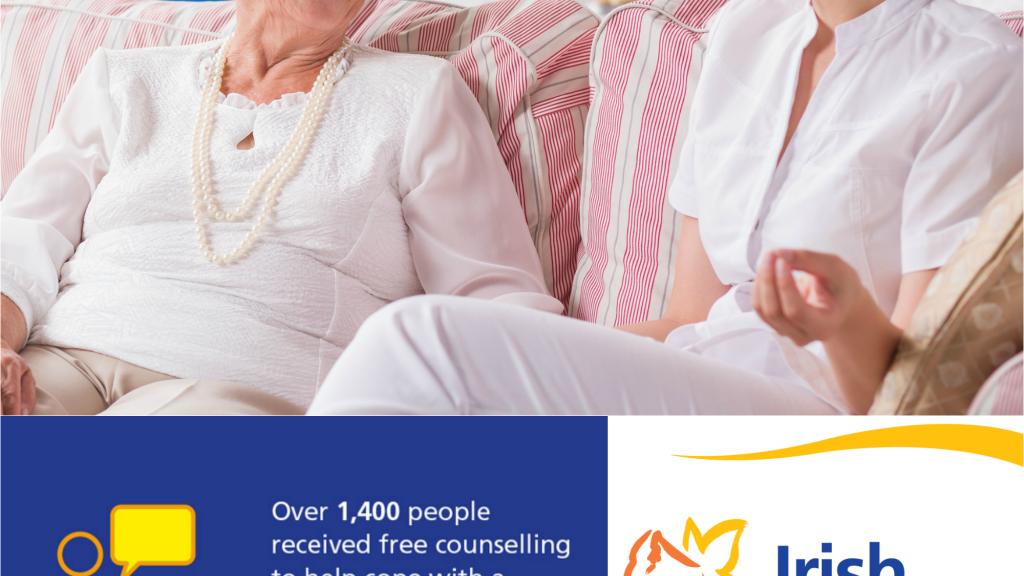
Surge in demand for cancer counselling services over 4 years
The Irish Cancer Society has released its 2016 counselling figures and said that the number of people accessing these services in cancer support centres has increased by 68% in just four years. If the data is compared over seven years the demand has increased a massive 490%.
However, it said women still make up the vast majority of the service, with over 7 in 10 of the clients in 2016 being female and just under 3 in 10 were male.
The number of people availing of the counselling service in 2016 was 1464 compared to 874 in 2012 and just 248 in 2009. The Society uses a short-term model, and often a client only needs one or two sessions to help them understand that their emotional reaction is normal and to enhance their own coping techniques.
[[{"fid":"7483","view_mode":"default","fields":{"format":"default","field_file_image_alt_text[und][0][value]":"Woman patting a man on the back reassuringly","field_file_image_title_text[und][0][value]":false},"type":"media","field_deltas":{"1":{"format":"default","field_file_image_alt_text[und][0][value]":"Woman patting a man on the back reassuringly","field_file_image_title_text[und][0][value]":false}},"link_text":null,"attributes":{"alt":"Woman patting a man on the back reassuringly","style":"height: 300px; width: 450px;","class":"media-element file-default","data-delta":"1"}}]]
Dorothy Thomas, Community Support Network Coordinator at the Irish Cancer Society said: “Once cancer patients embark on a cancer journey, they are supported with the physical aspects of their illness through the health system, attending hospital appointments and treatment.
“However, the emotional effects of cancer may not be felt until weeks, months or years after the initial diagnosis. Often, it is only after treatment finishes that they realise how much cancer has changed their lives. This is where the network of community based cancer support centres, affiliated to the Society, play a vital role in providing much-needed counselling services.
“Cancer diagnoses affect a huge network of people and often the support is needed throughout an entire family. In 2016, over half of our clients were the person who had been diagnosed, 17% were bereaved and 12% were a partner or spouse, with the rest making up children, parents and siblings.
“As we can see from the figures, we still have quite a lot of work to do to encourage men to attend our counselling service and address the gender imbalance. Only 28% of clients were male but on a more positive note, the numbers have increased slightly since 2015. We need to make sure that that men with cancer, and their wives, sons or daughters, know that there is plenty of emotional support out there for them – and that it’s ok to access it and look for that help.“
The affiliated cancer centres, which are all over Ireland, provide psychosocial care for cancer patients and their families in their own communities. The Irish Cancer Society works closely with these teams to provide a range of proven programmes, including the counselling service, free of charge to cancer patients and their families. Coping with cancer can be difficult and families may experience many emotions such as anxiety, fear and sadness.
The counselling service supports people of all ages affected by cancer. The majority of those attending the service were between the ages of 45-64 (50%) while almost one third of clients (26.3%) were between the ages of 18 and 44 with this age group experiencing significant issues such as relationships, fertility and careers, all impacted on a cancer journey. Clients under 18 made up 4.4% of clients, almost all of these children were struggling with the diagnosis of a sibling or a significant adult in their life.
Other main results from the report include:
- Breast cancer was the number one cancer represented and accounted for 31% of clients.
- Second was gastrointestinal cancers (bowel, oesophageal and stomach), which accounted for 13.1%.
- Brain cancer saw the biggest increase in clients, up 50% since 2015.
- 95% of clients reported an improved attitude to the future.
The Irish Cancer Society set up the service in 2003 to provide free of charge counselling to cancer patients, their families and those close to them. In 2009, it moved from direct delivery to a grant administration through local cancer support centres, increasing the number of communities reached and people supported.
In 2016, the Society granted €352,890 to support centres across the country to provide this free service to clients residing in each of the 26 counties in Ireland.
Anyone who is concerned about cancer or is interested in accessing the counselling service, can contact the Irish Cancer Society’s Cancer Nurseline on Freephone 1800 200 700, by email or visit our local support section.
